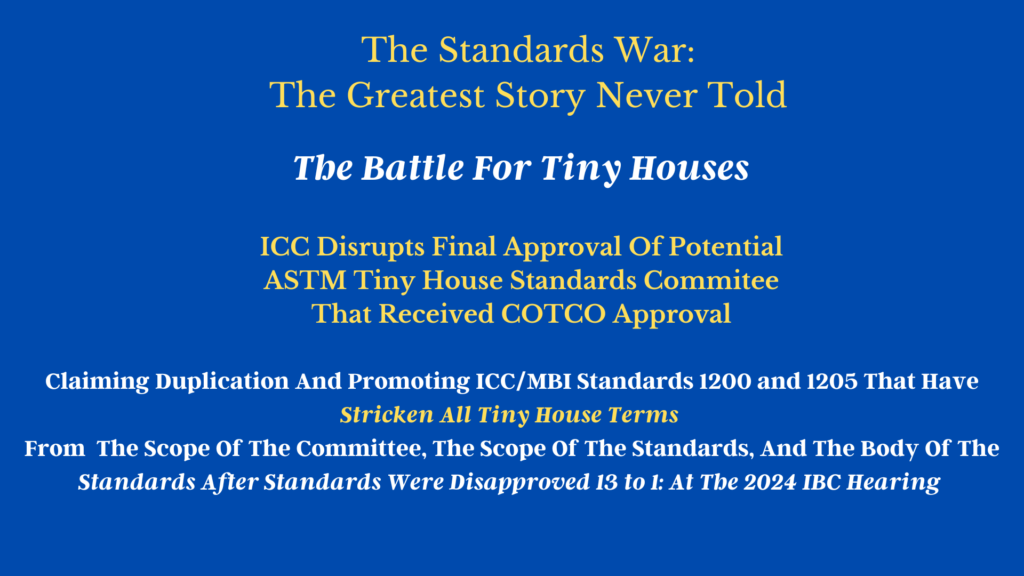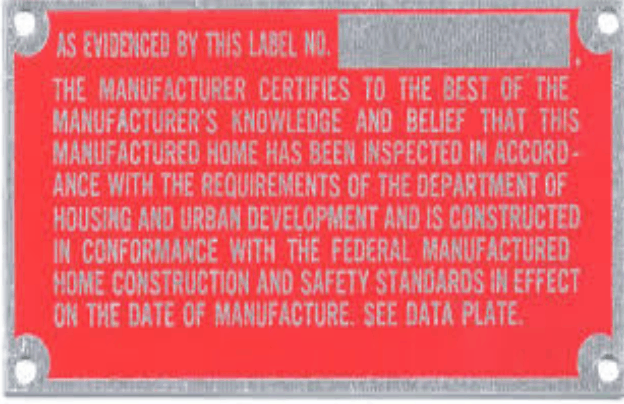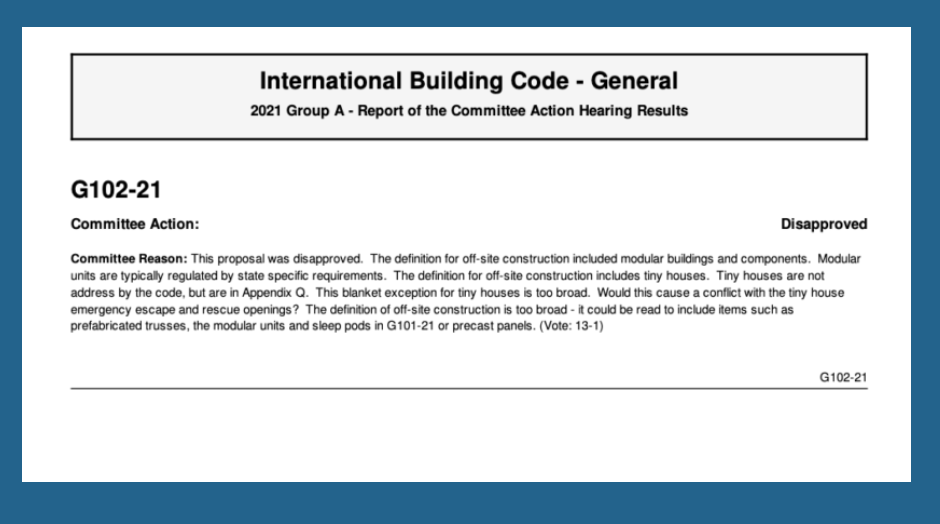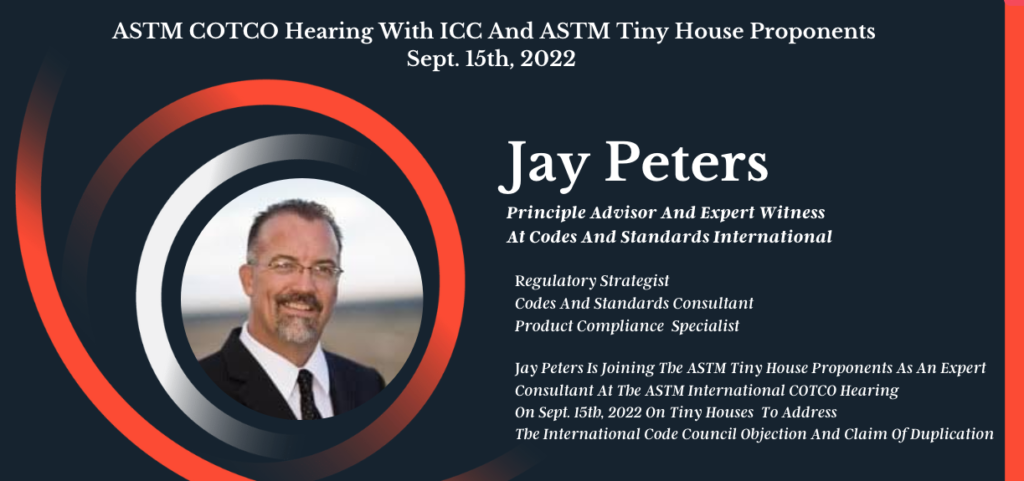ASTM COTCO Hearing Sept 15th, 2022 Addressing The ICC Objection
The future of the tiny house industry just got a lot brighter and we are very excited to announce that Jay Peters, the principal advisor and expert witness at Codes And Standards International is joining the ASTM Tiny House Proponents as an expert consultant at the ASTM COTCO hearing on Sept. 15th, 2022. Jay will contribute his 40-plus years of experience in the development of codes and standards and as an expert at hearings and appeals.
The hearing will be a closed session with the board of COTCO, the International Code Council ( ICC), and proponents in favor of the potential tiny house committee. COTCO is the governing board of ASTM International that grants new technical committees.
After more than a year of negotiation with stakeholders of the tiny house industry following the ANSI Essential Requirements for due process, COTCO granted a new committee for tiny houses to develop and maintain standards specific to tiny houses. The committee will go on indefinitely.
The COTCO hearing will give both the ICC and the ASTM Tiny House Proponents the floor in front of the entire board of COTCO to discuss the ICC objection and a rebuttal to the objection. The hearing will determine if the ICC objection bears any weight on the COTCO approval of the new ASTM Tiny House Technical Committee.
ASTM International Technical Committees
Technical Committees develop and maintain ASTM standards. They are grouped by designation according to related activities within a particular scope of work (ex: A01 on Steel, Stainless Steel and Related Alloys). ASTM Committees are made up of over 32,000 volunteers from industry and include manufacturers and consumers, as well as other interest groups such as government or academia. Any interested individual can participate on a Technical Committee through ASTM membership.
BIO Of Jay Peters
Prestigious Sanitation Honor Awarded to ICC’s Jay Peters
For years, the United Nations, World Health Organization and other noted groups that are working to eradicate death and illness due to lack of sanitation have been spreading the word about these and other horrific statistics: about every 15 seconds a child dies from a waterborne-related disease; over 40 percent of the world’s population (2.6 billion people) does not have access to toilets; safe drinking water is unavailable to 1.1 billion people. In fact, the global sanitation crisis is so critical that it has surpassed global warming as the highest priority for many global councils. Many organizations and professionals, like the International Code Council and its Plumbing, Mechanical and Fuel Gas Executive Director Jay Peters, are sharing their knowledge and time to help global groups to expedite the goal of eradicating illness and death caused by a lack of safe drinking water and access to proper sanitation worldwide. Some groups are recognizing these efforts.

ICC vs IAMPO vs ICC vs.....One Solution?
This week it was announced that ICC-ES filed a lawsuit in the United States District Court for the District of Columbia against IAPMO to stop what ICC purports to be an unauthorized use of ICC-ES materials and its knowing infringement of ICC-ES copyrights. IAPMO states that ICC’s accusations are unwarranted and their IAPMO UES stands by their process, reports, and rightful position in the marketplace as an alternative path to the ICC services.
Of course, two gorillas marking their boundaries and competing for food and affection in the same jungle will soon cross paths… sooner or later. The outcome from that encounter will prove to be painful for both combatants as well as their supporting family clans, regardless of who wins the battle.
Jay Peters Was A Senior Staff Member For The ICC As Well As A Senior Director With IAMPO
Jay Peters has joined the staff of the International Code Council as Executive Director of Plumbing and Mechanical Activities. Peters will be responsible for increasing the programs’ visibility and industry involvement; identifying new standards, guidelines and code-related matters; developing training programs and support products; and creating new avenues to advance ICC activities in the plumbing and mechanical arenas.
“The ultimate goal is to build a world-class plumbing and mechanical program with ICC,” said Peters. “Integrity and respect are the cornerstones of a credible program. The industry and the ICC membership’s commitment to public safety are crucial for success.”
Peters comes to the Code Council from the International Association of Plumbing and Mechanical Officials (IAPMO), where he served as Senior Director of Codes and Education. During his tenure at IAPMO, Peters was responsible for code development, education and certification programs and served as the Standards Council Secretary.

We Cultivated A Spirit Of Collaboration With ICC Early On
Sadly, the joy of the unanimous approval from COTCO was short lived, because on the same day, we received news that the International Code Council ( ICC ) sent an objection letter to ASTM.
To avoid duplication, or a conflict of interest, and to cultivate a spirit of collaboration, I personally reached out to ICC very early in our initial negotiation with ASTM and also made ASTM aware of the ICC Off-Site And Modular Construction Standards Committee that were developing two standards;
ICC/MBI 1200 Standard for Off-site Construction: Planning, Design, Fabrication And Assembly
1CC/MBI 1205 Standard for Off-site Construction: Inspection, Regulatory Compliance
We were shocked at the objection.
ICC Claims Of Duplication
ICC claims that we are duplicating and that there is no need to develop a new standard for tiny houses on wheels as a residence. ICC has stated that everything has been covered for tiny houses, including tiny houses on wheels between:
- The IRC
- The 2 ICC/MBI Standards 1200 an 1205 ( All tiny home terms have been stricken from the standards)
- ICC also states that tiny houses on wheels with a permanent chassis over 320 square feet are subject to the Manufactured Home Construction and Safety Standards administered by the US Department If Housing And Urban Development
We Do Not Agree With The ICC Objection
ICC is trying to broadly sweep tiny houses under either Modular construction or the Manufactured Home HUD code.
We are desiring to introduce a third option, a uniform construction standard for tiny houses on wheels that will result in a new classification for tiny houses on wheels, not an RV, not a modular, not Manufactured Home.

HUD Does Not Regulate Tiny Houses
HUD does not officially regulate tiny houses on wheels. If a tiny house was built to the HUD code, the label would be a manufactured home label. In the US, most tiny houses on wheels are built to RV standards, the 3rd party label would state compliance to NFPA 1192 or ANSI 119.5. If a tiny house was built to the Manufactured Home Construction and Safety Standards-it would be classified as a manufactured home, not a tiny house on wheels.

ICC/MBI Standards 1200 And 1205
The 2 ICC/MBI Standards 1200 and 1205 developed by the ICC Off-Site And Modular Construction Standards Committee (IS-OSMC) were disapproved at the IBC 2024 hearing and one reason was because the ‘definition of off-site construction includes tiny homes.’
Currently all tiny house/home terms have been stricken from the scope of the committee, the scope of the standards, and the body of the standards. The committee blamed the disapproval on the tiny home terms, but actually Tom Hardiman, with the Modular Housing Institute and co-chair of IS-OSMC that presented at the hearing, stated he did not know how to answer the questions regarding tiny homes, and no one from the tiny house industry was present to answer the questions.
The standards were not well received by the code council. The code officials also stated the code has already covered many aspects that the standards were addressing. The definitions are too broad for off-site modular components. Precast elements are already addressed in the code. One commenter saw conflicts with special inspections certification already addressed in the code.
Micah Chappell City Of Seattle, State Building Code Council was the first to make a motion to disapprove the standards, he stated;
‘’ IRC Appendix Q is not required to be adopted by states or it is not required to be used, and tiny house is not defined in the IBC. This proposal would take the tiny house, which is just a dwelling unit, and take the review and application requirements of that dwelling unit and push it to a standard.
I do not agree with that. When we are talking about tiny houses and Appendix Q, they are very specific, but there are two criteria here that are not defined, a tiny house on wheels, or a tiny house like the other modular buildings where it is possibly driven in and then craned onto a foundation. So blanket items for tiny houses, I do not agree with. ‘’
The Outcome Of The ASTM COTCO Hearing
I feel confident that COTCO will uphold the approval of the ASTM tiny house committee. It is our greatest hope to resolve the ICC objection and get down to business and do the real work that is needed and we will invite ICC to join the committee. As a courtesy to ICC, we are removing any references to Appendix AQ Tiny House and have removed the subcommittee for tiny houses on a foundation. Our only intention was to supplement and compliment the code, never to duplicate.
We will have one more final approval from the ASTM International board of directors after the ICC objection is resolved.


